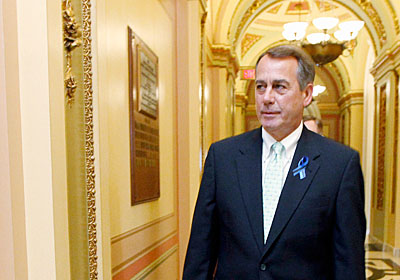Bloggers React to Boehner's Debt Ceiling Plan

As more details began emerging today about House Speaker John Boehner’s new debt-ceiling proposal, FrumForum decided to compile some initial reactions to the plan from around the Web.
The Washington Examiner’s Philip Klein is skeptical that Boehner can deliver on his promised spending cuts:
I'd like to see how many immediate, specific, spending cuts there are in this plan. Spending caps may be a part of an overall strategy for deficit reduction, but they're also another way to kick the can down the road by leaving future Congresses to define what will be cut to meet those caps … I'd like to see what kind of wiggle room future Congresses would have to get around those automatic cuts.
Nate Silver of FiveThirtyEight argues that the plan is politically risky:
… although calling Mr. Obama’s bluff on his stated refusal to accept a short-term increase might qualify as a tactical victory for Republicans, its longer-term implications are ambiguous. Polls show that the public has a lukewarm view, at best, of how Mr. Obama has handled the negotiations. But the ratings for Republicans are much worse, calling into question whether they would benefit from another round of negotiations next winter under the heat lamp of the presidential primaries. There are increasing suggestions in the polling that the public could tell both Mr. Obama and the Republican Congress to find a new line of work … Thus the real gamble that Mr. Boehner is taking: in seeking to trip up Mr. Obama, he may be putting his own majority at risk.
Greg Sargent of The Washington Post finds very little support for Boehner’s view that there should be a short-term
debt-ceiling increase:
Former officials who worked on the debt ceiling increase with Ronald Reagan — who remains a GOP icon despite the inconvenient fact that he raised the debt ceiling and taxes nearly three dozen times — didn’t think so when they were confronted with the idea … Independent financial analysts don’t think it’s a good idea. Several of them have concluded that a short term solution could result in a downgraded credit rating
The New Republic’s Jonathan Chait thinks that Boehner’s plan reflects sharp divisions in the House Republican caucus:
Between members who hate raising the debt ceiling and members who hate taxes and members who hate cutting a grand bargain with Obama (however favorable the terms), he can't do anything. So the default plan, as it were, is to do nothing: Keep the debt ceiling hanging around, don't make a deal, don't raise taxes. Boehner's plan seems entirely designed to minimize objections within his caucus.
Kevin Drum of Mother Jones perceives the plan as an effort to embarrass President Obama:
Boehner has rejected every possible compromise offered to him, and now plans to unilaterally hold a vote on the one thing — the only thing — that he knows Obama won't accept. This is all he cares about. He doesn't want to solve a problem, he just desperately wants to figure out some way to get Obama to say no so that he can make some political hay out of it.
Fred Barnes of The Weekly Standard thinks the plan is likely to face stiff opposition:
The plan … has two aspects that President Obama is desperate to avoid. It would require a second vote on lifting the debt ceiling next year and, Republican officials said, would involve no tax increases … But it also has at least one part that conservative Republicans are likely to dislike as well. Boehner adopted the proposal of Reid to have an equally divided committee of congressional Republicans and Democrats decide on the spending cuts to accompany the second stage of raising the debt ceiling.
Ed Morrissey of HotAir.com praises the proposal's requirement that both houses vote on another balanced budget
amendment:
Why not allow a vote on the BBA, especially after the debt-ceiling hike takes place? Democrats don’t want to go on record as opposing it, fearing what that vote will mean in the next election ... Republicans need to keep the pressure on the Senate for a floor vote on the BBA.
Joseph Lawler of The American Spectator is cautiously optimistic about the plan:
As always, the value of either plan would depend on its details. At this point, such an outcome could represent a good way out for Boehner and Republicans. Substantively, though, it would address the debt problem. Politically, Republicans would go into the 2012 elections with their desire to restructure and trim Medicare on the record, but without any results to show for it.

